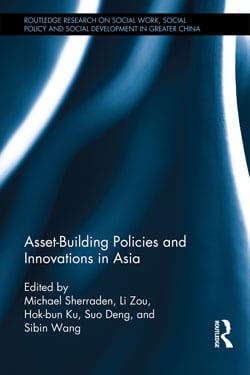Asian scholars, practitioners and policymakers share lessons about asset-building policies in Asia and chart the future in the new book “Asset-Building Policies and Innovations in Asia.” 
Director Michael Sherraden and International Director Li Zou of the Center for Social Development at the Brown School of Social Work at Washington University in St. Louis edited the book with Ben Hok-bun Ku of Hong Kong Polytechnic University and Suo Deng and Sibin Wang of Peking University.
“Asset-building policies and programs are in a period of emergence and testing around the world,” Sherraden notes in the book, released Nov. 27. “This is part of a larger pattern of strain and adaptation in social policy, as societies adjust to the transition from industrial era to information era.”
As asset-based policies continue to unfold, scholars, policymakers and development organizations in Asia “will decide how and to what extent asset-based innovations are relevant and useful,” he says. “This book is part of that effort.”
The book is a collection of analyses on asset-based social policies, programs and innovations across the Asia-Pacific region. The book covers a wide variety of topics, including homeownership in East Asia, the social security system in Singapore, asset building policy diffusions in Korea and Taiwan, savings accounts for youth in Nepal and asset research in China.
“We are very pleased to have five partner universities from the McDonnell International Scholars Academy institutions contributing to the book,” Zou said. Washington University founded the McDonnell International Scholars Academy to broaden international cooperation and understanding among people and institutions of the world.
The 2012 conference “Lifelong Asset Building: Strategies and Innovations in Asia” in Beijing spurred the book, which follows one published in Chinese in June 2014 titled “Asset Building: Strategies and Policies in Asia.” Peking University, Hong Kong Polytechnic University and Washington University organized the conference.
The 292-page book, published by Routledge, is available for purchase in hardcover from Amazon.